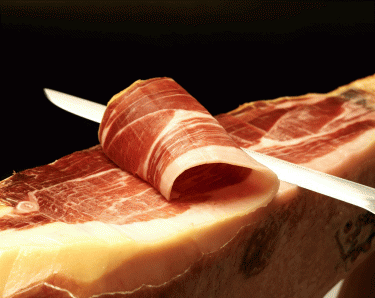
One slice or two? Jamón is one of Spain’s best-loved and healthiest delicacies, despite what the WHO report says.
A study published last week by the World Health Organisation (WHO), which suggested that processed meat should be considered as likely a cause of cancer as cigarettes, asbestos and plutonium, has been laughed off by Spaniards raised on a diet rich in that classic Iberian staple, jamón.
The WHO study naturally took aim at the worst examples of cheap, processed meat – think Turkey Twizzlers, frozen burgers and grey-looking sausages – but also included the classic Spanish creation in its report, grouping jamón together with all other types of meat…
Spaniards, naturally, were baffled. How could a delicacy – one that is naturally cured in fresh mountain air, made from the meat of free-range pigs fed a wonderfully organic diet, and completely untampered with – be grouped in the same carcinogenic class as limp hot dogs and chicken nuggets?
“It’s ridiculous to put jamón Serrano in the same category as a processed hamburger,” Ricardo Mosteo, head of the Designation of Origin (DO) board for the ham-producing region of Teruel, told The Local.
“In fact there are so many studies that show the health benefits of jamón, even for pregnant woman.”
The industry is worth billions to the Spanish economy, and the sale of ham legs alone reaped €1.5 billion in 2014, according to the Jamón Serrano Foundation.
But despite these rather ridiculous health warnings, the industry should not fear that Spaniards are going to turn their back on jamón any time soon: sales are actually rising as the economy recovers, with the average Spaniard consuming 5kg of Serrano ham a year.
Other pork staples, such as chorizo, lomo and morcilla are also enjoying an increase in sales, and regardless of what the WHO report says, Spaniards still enjoy the highest life expectancy in the EU – with meat playing a central role in the average diet of a typical Spaniard.
There is no cholesterol in jamón Serrano, and not only is it uniquely delicious but it is also high in protein and iron.
How, then, the foodstuff was grouped together with other (admittedly nasty) cheap processed meats in the report remains a mystery, but one thing is certain – Spaniards will continue the tradition of enjoying a few slices of jamón, washed down with a strong red wine, for many many decades to come. And why not? It is one of Spain’s most enjoyable and enduring pastimes.
 en
en



 Vlaams-Nederlands
Vlaams-Nederlands
0 Comments
Leave a Comment
DISCLAIMER
The opinions and comments expressed by contributors to this Blog are theirs alone and do not necessarily reflect the views of VIVA Homes Under the Sun Ltd, any of its associated companies, or employees; nor is VIVA to be held responsible or accountable for the accuracy of any of the information supplied.
Have you got something to say?